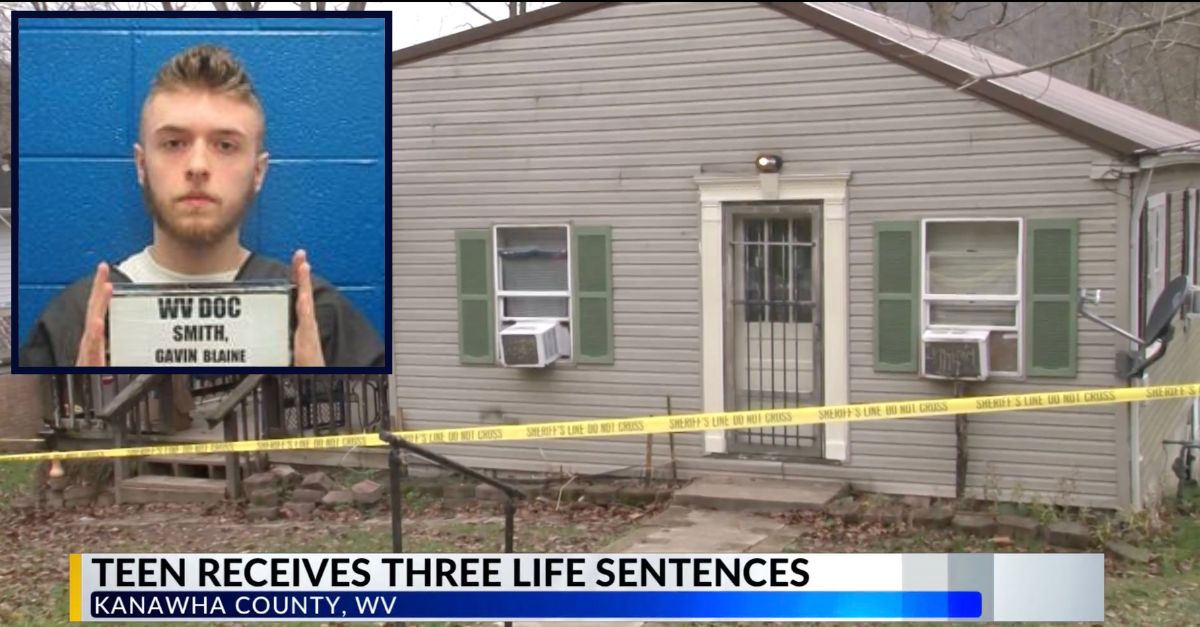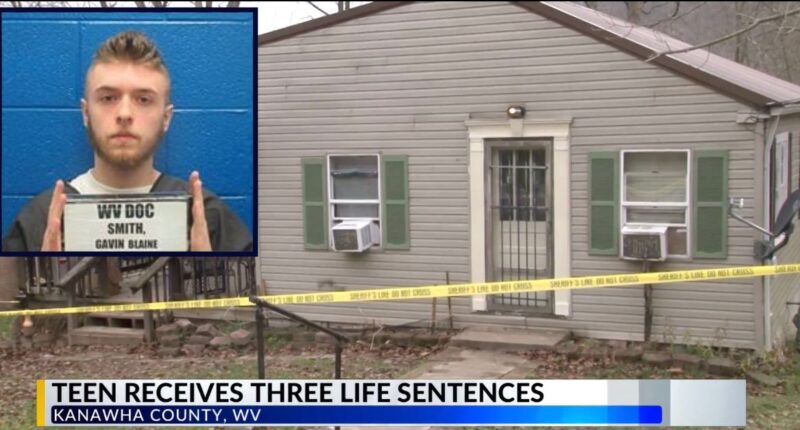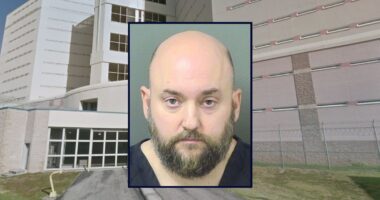
Inset: Gavin Smith (West Virginia Dept. of Corrections). Background: The home where Smith allegedly killed four family members in 2020 (WOWK).
Gavin Smith, the 21-year-old man in West Virginia previously found guilty of killing his mother, stepfather, and two younger brothers, will get a new trial after the state’s Supreme Court of Appeals on Monday vacated his convictions on three counts of first-degree murder and one count of second-degree murder in the 2022 slayings. His conviction on one count of using a firearm during the commission of a felony was also vacated.
A five-judge panel on the state’s highest court voted 4-1, holding that the trial judge committed a “reversible error” by improperly informing the jury that because Smith was a minor at the time of the murders, if he was found guilty of first-degree murder he would automatically be eligible for parole after serving 15 years of his sentence.
Smith was 16 years old when authorities say he fatally shot Daniel Dale Long, 37, Risa Mae Saunders, 39, Gage Ripley, 12, and Jameson Long, 3.
The issue first arose during the testimony of Rebecca Walker, Smith’s girlfriend at the time of the shootings. Walker, then 17 years old, had also been arrested and charged with multiple counts of fist-degree murder, but entered into a deal with prosecutors and pleaded guilty to four counts of accessory after the fact to first-degree murder. The agreement included a maximum sentence of 10 years in prison required her to testify against Smith at his trial.
During her testimony, Walker said that she was facing a possible life sentence for first-degree murder before agreeing to a plead guilty. The state objected, arguing that “the jury was left with the erroneous impression that Mr. Smith would ‘be locked up for the rest of his life’ if he was convicted of first-degree murder.
Love true crime? Sign up for our newsletter, The Law&Crime Docket, to get the latest real-life crime stories delivered right to your inbox.
After the close of evidence, the state argued that jurors may have been confused by Walker’s testimony about her potential sentence and an explanation from the court that juveniles convicted of first-degree murder in the state are eligible for parole after 15 years.
“[R]ight now the jury may think that he can only get 15 years for first-degree murder, and we’re concerned that the jury would be confused about that,” prosecutors said. The judge granted prosecutors’ request to clearly instruct the jury that Smith was facing a possible life sentence and would only be “eligible” for parole after 15 years.
Smith’s defense attorney objected, arguing that jurors were “supposed to be considering the facts, not considering the sentence,” saying the jury instruction “puts it right out there for them to be thinking about sentences.”
The court’s majority agreed with Smith’s counsel, reasoning that jurors are not permitted to consider “sentencing issues or other related issues that may flow from sentencing, such as parole or probation, when deliberating a verdict during a criminal trial.” Put another way, the court wrote that “questions pertaining to parole rights are not germane to the question of guilty or innocence.”
“While the State attempts to argue that Mr. Smith was not prejudiced by this instruction, other than describing the elements for first- and second-degree murder, the State cites to no law to support its contention that Mr. Smith suffered no prejudice,” the court wrote. “Despite attempting to argue that there was no prejudice, the State conceded that this penalty instruction ‘likely alleviated any jury question that someone who had not yet reached the age of 20 would not be forced to spend his entire life in prison with no hope of parole.””
“In other words,” the order continues, “this improper instruction eased any concern the jury may have had about forcing a juvenile to spend the rest of his life in prison.”
As Law&Crime previously reported, Smith’s grandfather on Dec. 13, 2020, found the family murdered in their home in the 1300 block of Cemetery Hill Drive in Elkwood, West Virginia. Each had suffered fatal gunshot wounds. Authorities said the likely motive for the murders was that Smith’s family wouldn’t let him see Walker.
Walker also admitted to encouraging Smith to kill his family.









